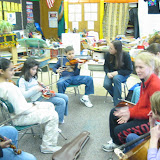Here are the audition results of the Fall 2007 Orchestra auditions.
First the Chamber Orchestra roster;
Fall 2007 Cornell Chamber Orchestra
Violins
Charlene Kluegel, Biology/Music, '10
Auriel Washburn, Undecided, '11
Haran Tae, Government/Psychology, '10
Aaron Wexler, Biology and Society, '10
Kasia Hozer, Biology, '11
Alex Fe, Biological Engineering, '08
Adam Sidor, Mechanical Engineering, '08
Alex Ma, Biology, '08
Sumona Bhattacharya, Undecided, '11
Tim Vo, Biology and Society, '10
Angela Chiang, Math, '11
Andrea Matho, English/Biology, '08
Brian Vaccaro, Biology/Chemistry, '08
Viola
Christina Butler, Animal Science, '09
Elbert Chang, Chemical Engineering, '11
Philip Chuang, Materials Science Engineering, '08
Jennifer Lee, Biology/Economics, '08
Claire Barbasch, Math/Music, '07
Michael Lee, Physics, '11
Cello
Abe Katzen, Biology, '08
Ellen Haynes, Animal Science, '09
Theresa Tan, Psychology, '09
Ricardo Villarreal, Biology, '11
Bass
Trevor Yeats, Grad
Keyboard
Dorian Bandy, Music, '10
The Symphony Orchestra
Cornell Symphony Orchestra Membership for Fall 2007
Violin I
Julian Kang, Chemistry/Biochemistry, '10
Alisa Timashpolsky, Biology, '11
Jian Liu, CS/Economics. '09
Marcus Cerroni, PAM '11
Sejin Bai, ILR, '11
Minerva Ho, China/Asia Pacific Studies, '10
Kevin Lin, Biology, '09
Chanha Carol Ohh, Operations Research, '10
Yvonne Chang, Architecture, '11
Sinsub Jeong, Engineering, '11
Christina Fiorenza, Human Biology/Health and Society, '09
Joanne Yuan Chua, Asian Studies, '11
Benjamin Ou-Yang, Astronomy, '10
Adrienne Carey, French Lit/Comparative Lit, '09
Erin Chu, Biological Sciences, '10
Violin II
Adrian So, Chemistry/Math, '08
Andrew Chen, Biological Engineering, '11
Kathryn Barger, Statistics, Grad
Eugena Fung, Economics, '09
Anna Nickless, Undecided, '11
Wallace Hui, AEP, '08
Jeremy Greiner, Chemistry, '11
Yubo Lu, Law, JD
Michael Chen, Computer Science, '10
Tina Hang, Economics, '09
Elizabeth Baker, ILR, '11
Yvette Wong, Math/Biology, '10
Collin Chan, Operations Research, Phd
Kirby Black, Biological Sciences, '10
Emerson Fang, Biology, '10
Viola
Joel Ong, Computer Science, '09
Mickey McDonald, Physics, '10
David Chang, Undecided, '10
Yoriko Nakamura, Biological Sciences, '11
Andrew Shook, Atmospheric Science, '09
Eric Auerbach, ILR, '10
Andrea Bowring, Engineering, '11
Joseph Hamilton, Comparative Lit, '10
Nick McAfee, Music
Kim Mezger, Mechanical Engineering, '09
Cello
Brian Lee, Chemical Engineering, '10
Alexandra Pavel, Government, '09
Isabelle Posey Cutting, Government, '10
Hilary Wattenberger, Hotel, '09
Jin Sung Kim, Engineering, '11
Alissa Sexton, Psychology, '10
Adrian Radocea, Engineering/Material Science, '11
Alexander Mora, Engineering, '10
Liz Hartman, Public Affairs, Grad
Alexander Sahn, Music, IHS
Sarah Smith, Physics/Music, '10
Stephen Moseson, Mechanical Engineering, '10
Jason Lee, Biology/Material Engineering, '11
Gretchen Craig, Environmental, '10
Bass
Laura Spitler, Astronomy, Grad - principal
Mike DeFlorio, Atmospheric Science, '09
Chris Gerig, '11
Kris Kooi, Music, '11
Harp
Janet Vertesi
Stephanie Beth Liff, '11
Sarah Blau, '10
Flute
Miriam Nussbaum, Linguistics, '11
Rebecca Morrow, Communication, '09
Alexander Tsiatas, Computer Science, '08
Annie Mulcahy,Hotel Management, '11
Piccolo
Christine Marschilok, Biology, '08
Oboe
Kit Stone, Science of Natural and Environmental Systems '11
Greg Weisbrod, '10
Shanon Sim, Chemical Engineering, '08
Clarinet
Jonathan Felbinger, Electrical Engineering, Grad
Vance Gao, Biology, '10
Bassoon
Melanie Adamsky, Biological Sciences, '09
Sarah Furnish, '10
Horn
Alexander Hong Chao, Computer Science, Grad
Kira Gridley, Biology, '11
Sallie Dietrich, French/Sociology, '10
Sarah Edythe Dimiduk, Biological Engineering, '11
Michael Barany, Math/College Scholar, '08
Trumpet
Anthony Clark, Music, '09
Trombone
Christopher Mayes, Physics, Ph.D
Christopher Stark, Composition, DMA
Sam Birmaher, Music, '10
Carl Seiber, Chemical Engineering, '11
Tuba
Percussion
Ian Chu Chen
Risa Naka
Brian Gainor
Jonathan Rothschild
Piano
Jake Jungbin Lee
Congratulations to those who have made it into orchestra.
Rehearsal starts on Monday, August 27 for Symphony and August 28 for Chamber Orchestra.













.jpg)




